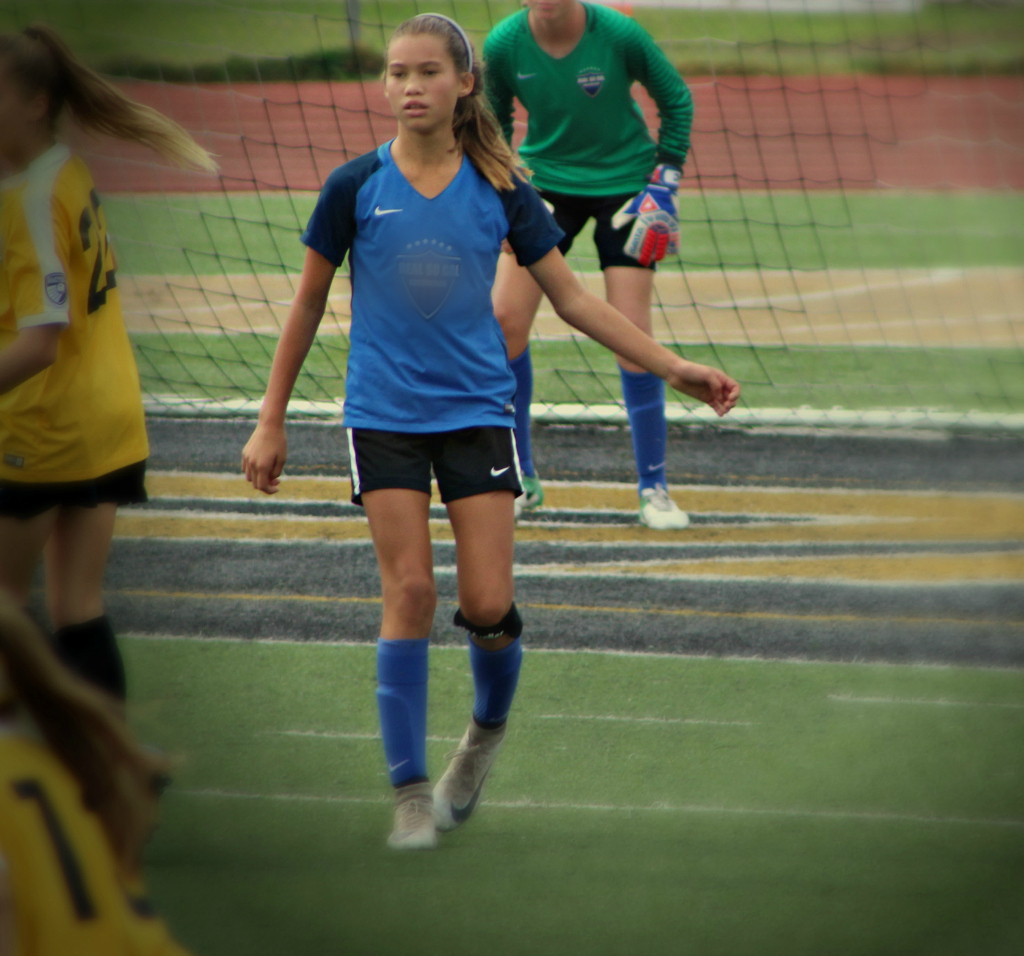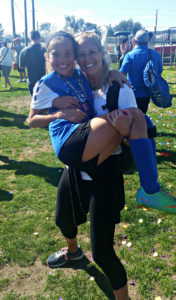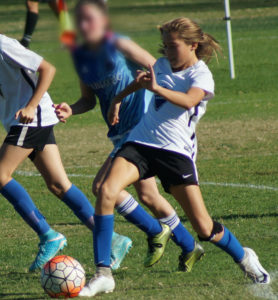
The Field Is Her Safe Haven
It’s like watching a gazelle play soccer. She’s graceful, fast and powerful! She owns the backfield, and the midfield, and any field she’s on! I have watched Macie play now for three years. She’s one of the top Academy players (plays a year above yer age) at one of the top Club Teams in our area. And she makes it look so easy, truly effortless. Little did I know how hard she was working all this time.
Not too long ago, her mom casually mentioned to me as we walked the track together during practice, that Macie had a recent flare up of her Tourette Syndrome. I couldn’t get my head around the words she just spoke. She went on to explain that Macie was nine years old when she was diagnosed with TS, a neurological disorder characterized by repetitive, stereotyped, involuntary movements and vocalizations called tics. At the time of her diagnosis, Macie was experiencing more than 100 different kinds of tics, repeated thousands of times over throughout the day. But when they first started, they had no idea what they were up against.
Read Here About Another Extraordinary Kid Getting His First Ever At Bat
Macie would make a weird gurgling noise or clear her throat – for the tenth time, and her mom kept assuming it was nerves or anxiety. She repeatedly told Macie to stop doing that and “bite your nails if you’re nervous.” The more Macie tried to control and stop the outbursts, the worse they got.
Throughout this time, the one place Macie would not get them was the soccer field. Leading up to a game and even in the warmups, they would flare up. But once she stepped onto the field and the whistle blew, it captivated her brain and she was freed from whatever it was that was taking over her body; the field was her safe haven.
Six months went by before her mom really knew something was not right. Typically, Macie loves the first day of school. But this time, something was different. Macie was dreading school starting back and had a meltdown in the school parking lot. She knew she would be “found out” if she tried to hold them in for an entire school day, still not knowing what was happening to her or how to control it. Macie started crying and couldn’t stop; it was all starting to come apart at the seams. This time her mom knew there was something really wrong and it wasn’t just nerves or anxiety.

Macie on the first day of school at age 9.
After forcing their way into the pediatrician’s office that day, they received devastating news; they were definitely tics and she exhibited both verbal and motor. The pediatrician had no doubt that it was Tourette Syndrome.
There’s something about hearing news about your child like this – even though it’s not life threatening, that rocks you to the core of your soul. The pediatrician suggested drugs, but they make you gain weight, and feel dizzy and light headed. Macie wouldn’t be able to play soccer. They agreed, no way.
So, they began a fight like no other. They saw several other specialists and tried sensory training, but only had minimal success. Each time they seemed to be making progress, they would end up back where they started or worse.
Still, somehow the soccer field remained her safe haven. Once the whistle blew, all of her energy and focus was channeled into the competition. Former USA Men’s Soccer goalie Tim Howard had the same experience, If a ball was coming his way or he was engaged in action on his end of the field, he would never tic. It wasn’t until the game would end or he would be at rest that the tics would return. Macie lived for game day and her seventy minutes of peace. Some researchers believe it can even help athletes. Because Tourette originates in the same section of the brain that controls motor function, it can supercharge the brain, allowing those with the disorder to not only keep the tics at bay, but to have extraordinary quickness and swifter reaction times – thereby helping them on the field. Tim Howard explained it as channeling all of his nervousness and energy into the game instead of releasing them with the tics.

Macie and her mom after winning State Cup
On the field, Macie was doing great, but off the field, her tics were increasing. Then one day, a co-worker of Macie’s mom, out of the blue asked her how things were at home – and she just broke down. Unable to hold it together anymore she just let it all out. That coworker told their boss, who called her into the office. Her typically stoic boss said, “So your kid has Tourette, guess what, so does mine. This is going to be okay.” It was the first time in a year that she felt the heaviness of the load she and Macie had been bearing, lighten somewhat. She had told almost nobody up to that point. Her boss told her exactly what she needed to do. And it started with a visit to a neurologist at Cedars Sinai who immediately got them started on an intense sensory training program.
The first step was to write down every single tic she was experiencing and identify on a 1-10 scale which one was the most upsetting. One was a throat gurgle, another a foot stomp, a third was an arm thrust, a fourth was a triple blink. There were more than 300 now. Then every night for 30 minutes while Macie did anything, homework, watch TV, draw, both mom and Macie were told to count how many times she had that one tick throughout the thirty minutes. The first time Mom counted 244 and Macie counted 12. The doctor said they couldn’t start the therapy until they both had the same number at the end of the thirty minutes. The idea was that until Macie could identify the tics each time, she wouldn’t be able to get rid of them. You have to name your enemy to defeat it, so to speak. At first, she couldn’t go for more than two seconds without one. This was not an easy task. But gradually one by one, she would focus on eliminating it and she would. The increments between got longer and longer and the tics began to decrease. After three weeks, she could go for two minutes without a tick. They were making so much progress. Sometimes they would try to sit quietly and paint together. With notebook in hand, Macie would track and then attack each and every tic that took control of her body. Macie tirelessly worked on her sensory training in the same way she dedicates herself to soccer. Today she is down to 2-3 tics. Yes, there are flare-ups occasionally due to stress or hormones, and although there is no cure for TS, Macie has learned to control it as best she can. And when you see her out on the soccer field, gracefully dominating the backfield, you would never imagine what she has been through to get there.
Macie wanted to share her story so that other children who might be going through something difficult or who have a condition that might make them embarrassed or afraid to try things would find strength or comfort in knowing there are a lot of other kids out there struggling with their own issues and that they are not alone.
Tourette Syndrome is actually much more common than you might think. The CDC says that for kids between the ages of 6 and 17, about one in every 360 kids will be diagnosed with the disorder. It also has affected many famous athletes and actors including, soccer superstar David Beckham, former NBA player Mahmoud Abdul-Rauf, Former USA Soccer goalie Tim Howard and former Major League Baseball player Jim Eisenreich.
Please watch this incredible video of kids talking honestly about what it’s like to have Tourrette. Hopefully we can all learn to be sensitive to kids and people with differences. https://youtu.be/e8HtTb0Vk_












